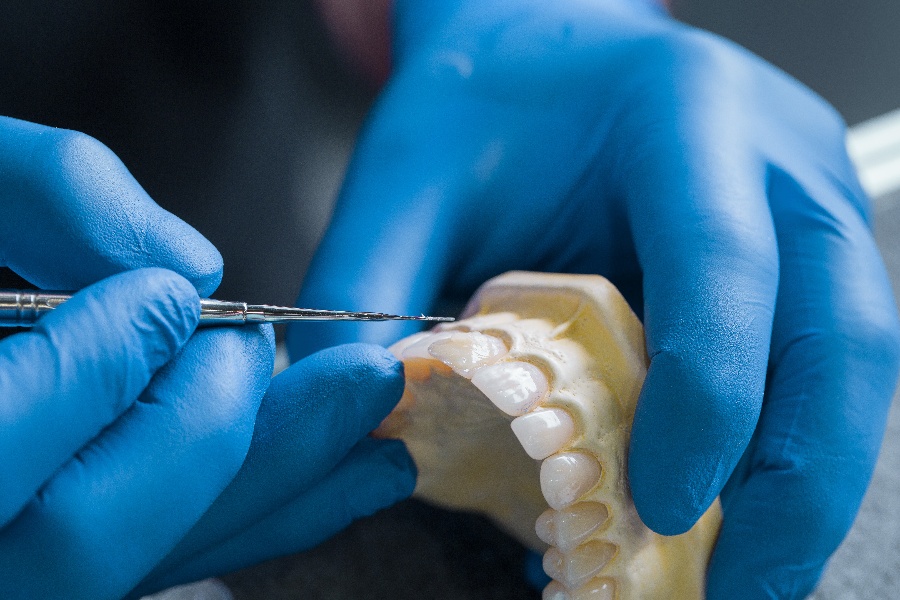One of the most common questions patients ask about a root canal treatment is, “How long does it take?” Maybe this is partially due to the “hurry sickness” epidemic that affects many of us. Some people may have heard from a friend or family member that their root canal took several hours and more than one appointment to complete. Yet, you may also have heard that the procedure took less than one hour. So, how long does a root canal take?
What Is A Dental Abscess?
An abscess is a collection of pus caused by an infection in your body. Your body responds to infection by sending white blood cells to the affected area to fight the infection. Pus then forms from accumulating white blood cells, germs in the area, and any damaged tissue.
The two most common infections affecting teeth are periodontal and endodontic (root canal) abscesses. A periodontal abscess is an infection of the gums and bone surrounding a tooth. It occurs when bacteria and pus accumulates in pockets in the gum outside a tooth. The treatment for a periodontal abscess can include a deep cleaning, periodontal surgery, or tooth extraction.
The second type of dental abscess is an endodontic or periapical abscess. This infection begins in a tooth's root canal space, known as the dental pulp. The infection eventually involves the gum and bone surrounding the tooth as the infection progresses. This irreversible process requires dental treatment such as a root canal or extraction.
What Causes A Tooth To Get Infected?
The outside of a tooth is protected by dental enamel, a substance harder than bone. Enamel is the first line of defense against tooth decay that can threaten the health of the underlying dental pulp. The pulp is a soft tissue composed of nerve fibers and blood vessels. Although it is often called “the nerve” of the tooth, it is much more than a single nerve. For instance, the pulp tissue is responsible for initiating the formation of a tooth.
Once a tooth is completely formed, the pulp lies dormant inside the tooth and does not serve any function vital to a tooth’s survival. This lack of a vital function allows dentists to remove a diseased pulp without removing the tooth. There are several possible causes of an abscessed or infected tooth, such as:
- Tooth decay. A small, untreated cavity can penetrate the enamel and underlying dentin and inflame the pulp. Without early treatment, this inflammation eventually causes necrosis, or death, of the pulp tissue.
- Trauma. When a tooth is hit, it can damage the pulp and lead to an abscess. This occurs more often on front teeth from sports injuries, automobile accidents, and falls. Symptoms can begin soon after the trauma or many years later. Discoloration or darkening of a tooth can indicate an infected tooth due to trauma.
- Cracked tooth. An untreated crack or chip in a tooth can allow bacteria from your saliva to penetrate a tooth and cause an infection.
- Periodontal disease. As periodontal disease progresses surrounding a tooth, it can lead to bacteria infiltrating and infecting the dental pulp.
What Symptoms Will I Have If I Need A Root Canal?
Delaying treatment can allow tooth decay to extensively destroy a tooth's structure, preventing your dentist from saving your tooth. This makes early diagnosis and treatment of your symptoms critical to maintaining oral health.
A root canal treatment can save most severely inflamed or infected teeth. The symptoms you may experience include:
- Spontaneous, throbbing pain
- Acute and prolonged sensitivity to hot or cold foods and beverages
- Pain when chewing
- Pain that radiates to the ear, temple, or neck
- Swelling in the gum, jaw, or face
- Loosening of your tooth
- Tooth discoloration
- Chronic bad taste in your mouth
- Swollen, tender lymph nodes
- Fever
- Malaise
- Difficulty swallowing (This could require immediate attention and quickly become a medical emergency)
Are There Alternatives To Getting A Root Canal?
You often have several choices when it comes to dental treatment. For example, you might choose between two good options: veneers or crowns, a fixed dental bridge or implants, or porcelain or gold crown. However, this is not the case once you are told that you have an infected tooth and need a root canal.
Unlike infections in other parts of your body, the blood cells necessary for healing can't reach the source of a tooth infection. Instead, because the dental pulp is encased within the tooth, it persistently infects the surrounding bone and gum tissue through the opening at the tip of a root until it is removed.
While herbs and other natural remedies may benefit some conditions, the only treatment for an abscessed tooth is a root canal or extraction.
How Long Does A Root Canal Take?
There is not a simple or single answer to this question for several reasons. Because every patient's tooth is different, root canals can vary widely and significantly impact the time it takes to complete treatment. For this reason, it is not unusual to hear of simple root canals that take a short, single dental visit. In contrast, others require several hours over multiple appointments. The factors that can influence the time it takes to complete a root canal include:
- The severity of infection. Your dentist may require that you have multiple visits to ensure that a severe infection is resolved before completing the root canal. Severe infections can prevent you from opening your mouth wide enough for treatment. Or, you may have so much pus that it will interfere with the effectiveness of the root canal filling.
- Access to the tooth. Some treatments take longer because of the difficulty your dentist has in reaching the tooth with endodontic instruments. This usually occurs in back teeth, small mouths, or when the patient has limited jaw opening.
- Anatomy of the tooth. Teeth with multiple roots and extra root canals can take significantly more time to complete.
- Anesthesia. Anesthesia can wear off before the completion of the root canal for several reasons. When this happens, your dentist may decide that it is to your advantage to delay completing treatment until the next visit.
- Jaw fatigue. If your jaw becomes sore and you cannot keep your mouth open, you likely will need multiple visits to complete your treatment.
- Patient’s comfort. Some patients find it challenging to sit for long periods for several reasons. One of the most common is a pre-existing back problem. Your dentist will always place your health and comfort first.
Conclusion
It is natural to ask, "how long does a root canal take?" However, it is important to remember that the long-term success of treatment does not depend on this factor. So, no matter how long it takes, you can be confident that your dentist at Palmetto Dental Arts will take the time necessary to achieve the best result.
Schedule An Appointment
The oral health professionals at Palmetto Dental Arts are committed to providing the highest possible care to enhance your smile and maintain optimal oral health. Contact us online or call us to learn more about how we can help answer all your questions about a root canal treatment.





